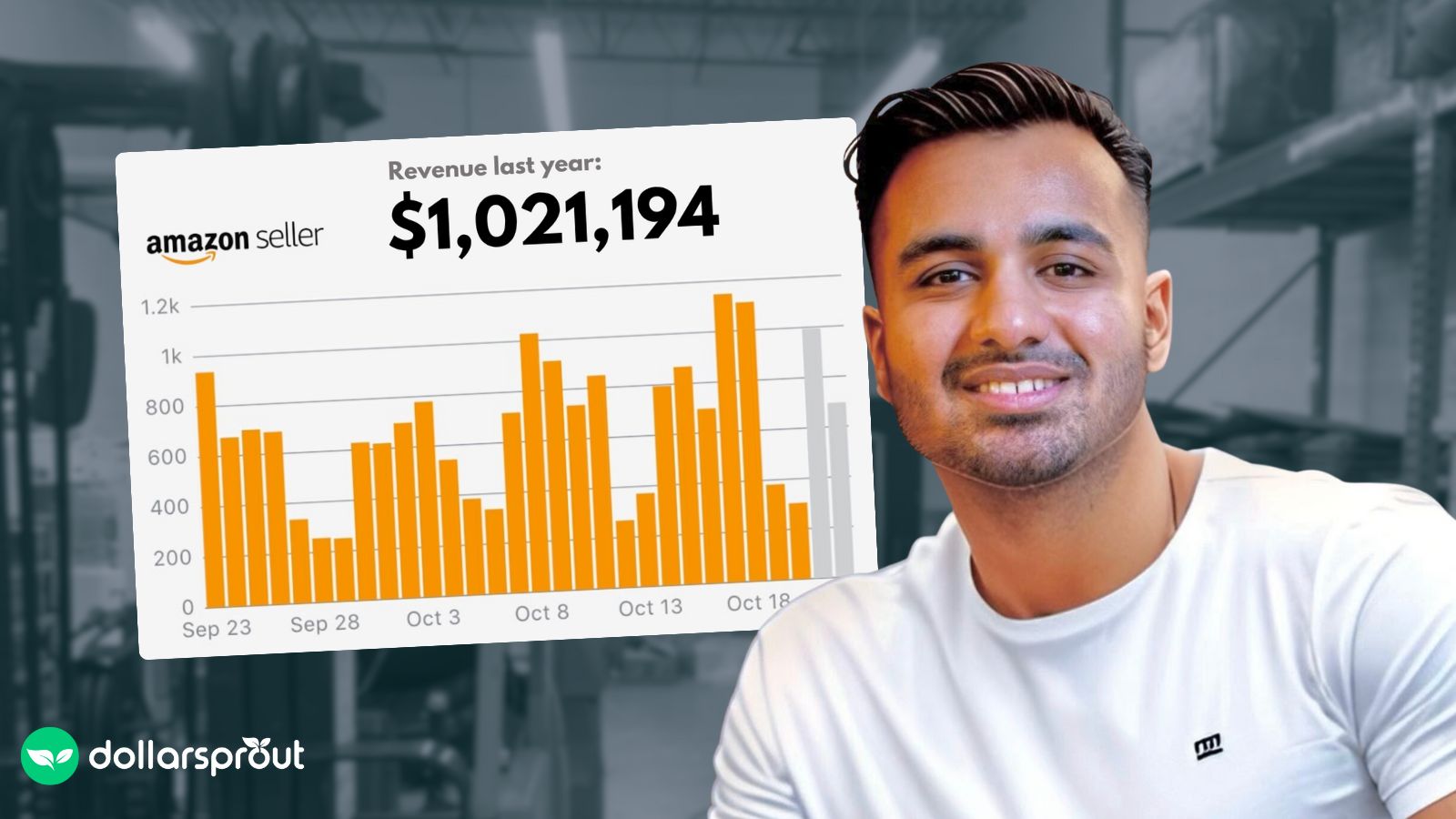From Law School to $1 Million Amazon FBA Business
Shaff Qureshi built a seven-figure e-commerce business during the little free time he had between law classes. Here's how he did it, plus tips for those interested in trying.

In 2018, Shaff Qureshi was just another law student at Hofstra University, grappling with the pressures of academia with the realization that his true passion lay elsewhere. Fast forward to 2024 and Qureshi has transformed his life, building a thriving Amazon FBA business that now boasts a seven-figure annual turnover.
With an impressive $350,000 in sales during his first year, Qureshi’s business has grown exponentially, doubling its revenue every year and solidifying his place in the competitive e-commerce space. From finding the right products to learning the ins and outs of selling on Amazon, Qureshi’s journey from law school student to e-commerce success is a testament to the unexpected success that can arise from being willing to learn new things.
From Law School to E-Commerce
Qureshi’s shift from working in law to running a successful Amazon FBA business started with a crucial realization. Despite his academic achievements — a Doctor of Law from Hofstra University School of Law — Qureshi found himself questioning his future in law.
“After ruthlessly studying during my first year of law school, I did not meet my own expectations by attaining top-of-the-class grades,” he said. “This is all while I had to force myself to study topics I simply wasn’t interested in. I decided that my skills would be better elsewhere, maybe an online business.”
Qureshi had always enjoyed building things, from Legos and puzzles to assembling furniture from Ikea. This hands-on creativity led him to think outside the conventional career paths. “If I wasn’t going to be #1 in law school, then I wanted to be #1 elsewhere,” he noted.
In 2018, during his second year of law school, Qureshi began exploring the world of e-commerce. He dedicated six months to intensive research on Amazon FBA, reading over 20 books and listening to numerous podcasts. “My thought process was that if I can digest 20 pages of complex case opinions written by elite Yale lawyers, then I can understand anything,” he explained. By mid-2019, he had launched two brands: one in office supplies and another in tools and home improvement.
Today, Qureshi operates multiple private-label brands and is most passionate about his Amazon Performance Marketing Agency, Jungle Advisor. His journey from law school to e-commerce showcases a practical pivot to an industry where he could fully utilize his skills and interests.
The Appeal of Amazon FBA
Qureshi was drawn to the Amazon FBA model for its scalability. “I saw entrepreneurs scaling their companies very quickly to millions of dollars,” he recalled. The FBA model allowed him to focus on generating demand for his products where Amazon handled the storage, packaging, and shipping of items to customers. “As an Amazon FBA private label brand operator, you’re mainly focusing on generating demand for your products by focusing on marketing, price, and attributes your customers care about,” he explained.
Settling on the right niche was a critical decision for Qureshi. He ultimately opted for the office supply category, ditching his tools and home improvement venture, due to its lower competition and potential for quality differentiation. “Office supplies was an attractive category because I was able to develop our own products that cannot be copied,” he said.
The aggressive competition in other categories, particularly from international sellers, made office supplies a more viable option for building a sustainable brand. “Chinese competition was and is still very aggressive on Amazon because products can easily be copied and sold for way lower prices,” he noted. By focusing on quality rather than price, Qureshi positioned his products to stand out in the market.
The lower marketing costs associated with office products also played a significant role in his decision. “The cost to market office products was low, therefore we could spend larger budgets to acquire customers,” he added. This strategic choice allowed Qureshi to allocate more resources to customer acquisition, setting the foundation for his brand’s growth.
Related: How to Start a Dropshipping Business in 8 Simple Steps
Explosive Growth and Key Milestones
Qureshi’s Amazon FBA business saw remarkable growth right from its first year. “Our first year of business we did $350,000 in sales, and since then we’ve grown more than 100% in revenue every year,” he shared. Today, Qureshi’s business boasts a turnover exceeding $1 million annually.
A key factor in this growth was Qureshi’s focus on addressing a specific customer need with a particular product. “One thing that helped us capitalize on this growth was focusing on one particular customer and one particular product that solves the customer’s problem,” he explained.
By honing in on a single issue and perfecting a solution, Qureshi was able to build a loyal customer base. “Once we solved that unique problem for our customer, we were able to understand the customer really well. From there, it was easier to cross-sell the rest of our catalog of items.”
Qureshi emphasized the importance of focusing on solving a singular problem, a strategy that helped distinguish his brand in a crowded market. “I’m a big believer in focusing on solving a singular problem. This is what separates you from your competitors. If you can do one thing really well, you make a name in the market as your happy customers will tell others.” He observed that many entrepreneurs lose sight of what made their product successful initially and advised staying true to the core value proposition that appeals to customers.
Overcoming Challenges and Learning Resources
Starting an Amazon FBA business was not without its challenges for Qureshi. One of the biggest hurdles he faced was the need for consistent investment to maintain and grow inventory. “One obstacle as an Amazon seller is the consistent need to invest cash into ordering more inventory,” he explained. Although his brand became profitable early on, scaling required greater financial resources.
Fortunately, Qureshi was able to leverage support from his family. “I was very fortunate to have family members who are serial investors. I drafted a presentation to raise money and convinced one of my uncles to invest,” he said. This experience taught Qureshi the importance of being an elite salesperson to secure necessary resources. “In business, you need to be an elite salesperson to get far,” he noted.
In terms of learning resources, Qureshi turned to books, podcasts, and online courses to build his knowledge base. He started with Product Research 101 by Renae Clark and How to Sell on Amazon for Beginners by Money Maker Publishing.
“Recently, many books have been released surrounding Amazon FBA. But the best and most informative book I’ve ever read is Ride the Amazon Wave by Tomer Rabinovich,” Qureshi shared. Podcasts like The Private Labeler Show by Nick Landowski also provided valuable insights.
Qureshi recommended a hands-on approach to learning, emphasizing the dynamic nature of e-commerce. “A ton of content becomes obsolete as the e-commerce space is so dynamic. One really cool resource is Udemy.com. You can easily take beginner courses on Udemy.com surrounding Amazon FBA. But the best way to learn as always, is hands-on experience by getting started,” he advised.
For beginners, Qureshi suggested focusing on basic business principles from a digital retail standpoint, including finance, supply chain, and marketing. “You can easily take an inexpensive course on Udemy.com on the above topics,” he added.
Product Sourcing and Competition Strategies
Navigating the complexities of product sourcing and staying ahead of the competition are crucial aspects of running a successful Amazon FBA business. We asked Qureshi to share his strategies for finding and sourcing products, as well as how he manages competitive pressures in the market.
“The e-commerce space is extremely dynamic. There are always new solutions to solve a problem,” Qureshi said. Initially, his approach to sourcing involved contacting multiple manufacturers and ordering samples to find the best fit. “When I started my brand, we were using the traditional way to source. You would contact 5 to 10 manufacturers on Amazon, order a sample from 3 or 4, and see which one met your needs.” As his business grew, Qureshi began working with consultants and sourcing experts to identify reliable manufacturers. “These days, due to our capacity and needs, we have consultants and sourcing experts that identify worthy manufacturers.”
The key to successful product launches in 2024 goes beyond just finding a market gap. “Pre-2021, we would scrape data to find where there was a gap in the market and eventually fill that gap by launching a kick-ass product,” he explained. “In 2024, you still scrape data to find where there is a gap in the market. But it takes more than empirical data to have a successful product launch. You must also have amazing creative content, PR surrounding your brand or product, and more importantly, innovate your product enough to give the customer a 5-star experience.” With increasing customer acquisition costs, Qureshi emphasized that simply running a marketing campaign is no longer sufficient.
Handling competition, particularly in the office supply category, requires constant innovation and adaptation. “Competition in the office supply category increases every year due to new brands entering the market or brands lowering prices to get customers to purchase their products,” Qureshi noted. To stay ahead, his team focuses on leveraging new software solutions, innovating their product catalog, and exploring new markets or sales channels. This proactive approach helps them maintain a competitive edge in a crowded marketplace.
Related: 48 Small Scale Business Ideas for Beginner Entrepreneurs
Launching a New Product
Qureshi says he has developed a meticulous process for launching new products on Amazon FBA, combining market data with customer feedback to ensure success.
“Launching a new product on Amazon is a process in which you must connect market data, along with customer feedback,” Qureshi explained. This approach involves a detailed examination of market needs and customer preferences to create products that stand out. “This process is long and if you get it wrong, your first product might not be a success. But if you can get this process right, you might just have started a sustainable business.”
Qureshi recommended several essential software tools that aid in product research and listing optimization:
- Sellerboard: For financial reporting
- Keepa: To track sales rank in a timeline format
- SmartScout: For market and subcategory research
- Datarova: For keyword research
- JungleScout: For product research
“In order to get started, you need the right software,” he emphasized. These tools help Qureshi and his team identify market gaps, optimize listings, and monitor performance metrics, ensuring their products meet market demands and customer expectations.
Related: 19 Profitable Digital Product Ideas to Sell Online
Managing Logistics and Inventory
Ensuring that products are always in stock and ready to ship can make or break an e-commerce business, and Qureshi has developed a strategic approach to handle these challenges.
“Managing inventory on Amazon can either make or break your business. It’s the one part of the system where you need to be the most strategic as it holds the most capital,” Qureshi explained. To keep track of inventory levels and avoid stockouts, his team manually built spreadsheets that help monitor inventory closely. “We usually stay about 60 days in-stock at all times,” he noted.
Qureshi’s inventory management strategy involves placing the majority of their stock in Los Angeles, California, with some inventory held locally as well. This approach ensures that they can quickly replenish stock and meet customer demand efficiently. “The majority of our inventory sits in Los Angeles, California while some of it is locally held as well,” he added.
Maintaining optimal inventory levels and strategic placement has been crucial for Qureshi’s business growth, helping him avoid the pitfalls of overstocking or running out of popular items. His meticulous attention to logistics ensures that customers receive their orders promptly, which in turn, bolsters customer satisfaction and repeat business.
Related: How to Make Money on Amazon (14 Popular Methods)
Common Mistakes and Key Takeaways
For new Amazon FBA sellers, there are several common mistakes to watch out for, and Qureshi has some practical advice on how to avoid these pitfalls. “New and rambunctious Amazon FBA sellers enter the market looking forward to innovating and disrupting the category. But they forget that their product offer must be better than existing ones,” Qureshi warned.
Qureshi stressed the importance of making product listings stand out with compelling images and clear storytelling. “Find a way to make your images tell the story of your product more clearly,” he advised. He also cautioned against competing solely on price. “Don’t race to the bottom with price; you can always be premium.”
Effective digital marketing is another critical component for success. Qureshi recommended running strategic advertising campaigns and driving traffic from multiple sources. “Run strategic advertising and drive traffic from many sources,” he said.
Reflecting on his own journey, Qureshi identified key factors that contributed to his success and shared what he might have done differently. “Everyone has their own way to success as all of our challenges are different. But I think the most crucial factor in the success of my brand was that I was consistently learning new things about selling in the e-commerce space,” he explained. Qureshi worked seven days a week, often juggling law school and his burgeoning business. “I worked 7 days a week and can’t think of a day when I was not working. I still work 6 days a week and if I’m not in the office, I am working on my iPhone.”
Qureshi’s advice for aspiring Amazon FBA entrepreneurs emphasizes resilience and patience. “Another piece of advice for aspiring Amazon FBA sellers is the ability to overcome failures. Lastly, be patient and trust the process. Things don’t happen overnight, in a week, in a month, or maybe even 6 months. But stick to it, and take whatever you’re doing seriously,” he encouraged.
While Qureshi has no regrets about his journey, he did reflect on the challenges of balancing law school and his business. “If I could go back in time, I would have dropped out of law school and solely focused on building the business. I put my mind and body through a lot while juggling law school and building the business. I also neglected a ton of close family and friend relationships during the process.”
What the Future Holds
Qureshi’s entrepreneurial journey doesn’t stop with his Amazon FBA success. He is additionally channeling his passion into JungleAdvisor.com, his Amazon Performance Marketing Agency. “We help brands with performance marketing (PPC) and Amazon brand management,” he shared.
His agency has already made a significant impact, assisting even 9-figure sellers in growing their businesses on Amazon and optimizing their marketing efforts. “Our agency has helped many 7-9 figure sellers grow their business on Amazon and make their marketing more productive than ever.”
Related:












